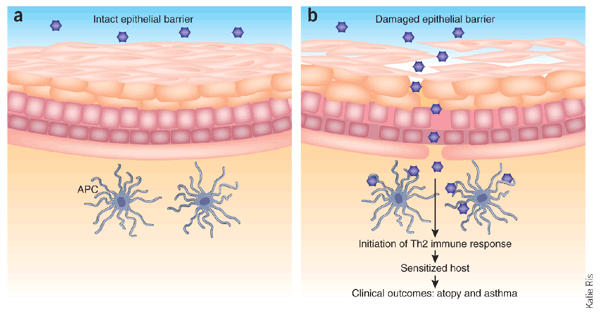
When we first started work with people living with cancer, we focused on helping them to deal with the side effects of chemotherapy and radiation. Over the last year, however, we realized that we talk a lot about compromised skin. Chemotherapy and radiation treatments are notorious for causing skin problems, and even after treatment is over, skin can continue to be dry, itchy, and flaky, making this one of the most common and frustrating long-term side effects.
The more people asked about various skin conditions and the more we talked about it, the more we realized that this problem is widespread, and hits all kinds of people-not just those affected by cancer. People across the nation suffer from a variety of skin problems, from rosacea to psoriasis to eczema to inflammation to just plain dry, itchy skin. In fact, according to the National Ambulatory Medical Care Survey, 37.9 million visits were made to an office-based dermatologist for skin conditions in the U.S. in 2001, and 12.1 million visits were made to the physician’s office for skin rashes. So the big question becomes: Just what is compromised skin, and what can we do about it?
What is compromised skin? Simply put, compromised skin no longer has the ability to protect and maintain itself. Something has impaired that ability, leaving it vulnerable to problems.
More specifically, when we’re talking about compromised skin, we’re usually referring to damage in the outer layer. This is the part of the skin we can see-the part that gives skin its color and that usually works like a protective blanket for our bodies.
We can think of skin as having three layers:
- the outer, protective layer (epidermis),
- the middle layer (dermis), which contains small blood cells, hair follicles, nerve cells, sweat glands, collagen and elastin, and
- the lower layer (subcutaneous), which contains layers of lipids or fats and connective tissues, and attaches the skin to everything underneath.
In compromised skin, the outer layer (epidermis) has been damaged. You can think of it like a blanket that’s frayed and thin with several small holes and tears. This causes two problems: 1) the skin can no longer hold onto moisture as well, causing dryness, flaking, itching, and redness; and 2) the skin can’t protect itself as well, making it more vulnerable to environmental toxins, harmful UV rays, bacteria, allergens, and harsh chemical ingredients in personal care products.
What causes compromised skin? Many different things can damage the outer layer of skin/skin barrier. Researchers recently discovered, for example, that malfunctions in certain genes that direct the formation of the outer layer can lead to psoriasis. Other skin problems like dermatitis and eczema also involve a compromised outer layer, though what causes that skin barrier to break down scientists aren’t sure. There does appear to be a connection in people who suffer from asthma, hay fever, and allergies, and again, there appears to be a genetic link, as these problems often occur in families.
Other health issues such as cancer (and cancer treatments), AIDS, and diabetes can also affect the skin and barrier. For people with diabetes, for example, high blood-sugar levels can cause skin conditions that:
- thicken skin on the back of the neck and upper back,
- create patches of discolored skin on the chest and abdomen,
- darken and thicken skin in various areas of the body,
- and several other potential issues.
Medications and medical treatments can also be a source of skin problems. Radiation and chemotherapy, for example, can cause burning, dry skin, flaking, redness and itching. Birth control can cause melasma, a condition where women develop dark patches on their faces. Cholesterol-lowering drugs can cause dry skin, as can diuretics, and the list doesn’t stop there.
Chemical irritants like soaps and hair dyes can also trigger skin inflammation, which can again damage the outer layer. In fact, when we start looking into it, we can see that the skin is vulnerable to assault from all kinds of things, which is why so many people from many different walks of life suffer from skin conditions. This is also why these conditions can be difficult to treat. If you’re not sure of the exact cause, for example, it’s tough to find a solution, which is why for many skin conditions there often is no permanent cure.
Don’t give up hope, however. There are several ways to alleviate painful and irritating symptoms and help improve the condition of the skin. and promote skin barrier repair. We’ll talk about these in future posts, so be sure to come back for more information!
Are you suffering from compromised skin? Do you have tips for our readers?

